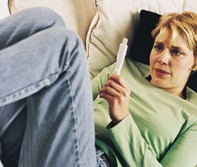Peer Reviewed
Feature Article Contraception
Contraception for women aged over 40: an important but neglected area
Abstract
Older women need to be provided with evidence-based advice to guide their decision on whether to use contraception, and the method to use. Regular review of contraceptive options is important because a woman’s preferred method at the time of the perimenopause may be very different from that chosen in her early 40s.
Key Points
- Women over 40 require evidence-based information about their need, and options, for contraception to reduce the risk of an unintended pregnancy.
- Oestrogen-containing contraceptives and depot medroxyprogesterone acetate injections can be used by women up to the age of 50; after this age, women should switch to an alternative progestogen-only or non-hormonal method until contraception is no longer required.
- Women over 50 who are using a non-hormonal contraceptive can be advised that contraception is no longer required after 12 months of amenorrhoea; those below the age of 50 should wait for two years of amenorrhoea.
- Women over 50 who are amenorrhoeic while using progestogen-only contraception can be advised to continue using the method for only another 12 months if they have two follicular stimulating hormone levels of 30 IU/L or above taken six weeks apart.
Purchase the PDF version of this article
Already a subscriber? Login here.

